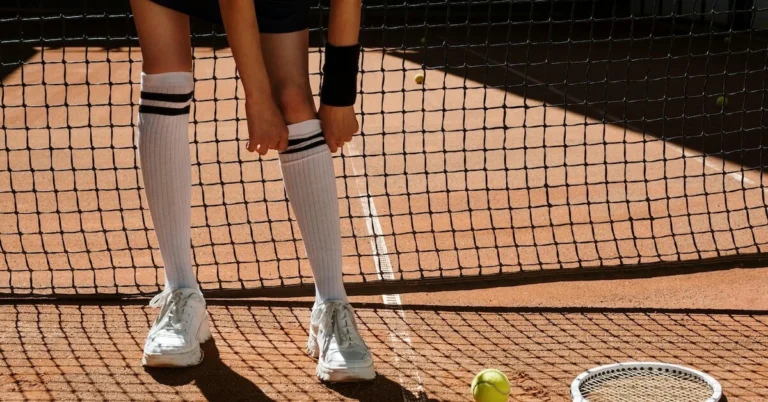When it comes to tennis, nutrition plays a crucial role in optimizing performance on the court. I have learned that eating the right foods at the right time can make a significant difference in my energy levels, endurance, and overall performance. In this article, I will share some practical recommendations for tennis nutrition that can help players at all levels achieve their best on the court.
To start, it is important to understand that tennis is a physically demanding sport that requires a combination of strength, speed, and agility. This means that tennis players need to fuel their bodies with the right nutrients to ensure they have the energy and stamina to perform at their best. Proper tennis nutrition can also help reduce the risk of injury and aid in recovery after matches and training sessions.
In the following sections, I will provide some specific recommendations for tennis nutrition, including what to eat before, during, and after matches, as well as tips for staying hydrated and maintaining a healthy weight. By following these guidelines and making tennis nutrition a priority, tennis players can give themselves an edge on the court and perform at their best.
Understanding Tennis Nutrition
Tennis nutrition plays a crucial role in optimizing performance for tennis players. Proper tennis nutrition can enhance energy levels, improve endurance, and reduce the risk of injury. In this section, I will discuss the importance of nutrition in tennis and the key nutrients that tennis players should focus on.
Importance of Tennis Nutrition
Tennis is a physically demanding sport that requires a combination of speed, power, agility, and endurance. Tennis matches can last for several hours, and players need to maintain their energy levels throughout the game. Proper nutrition can help tennis players achieve this by providing the necessary fuel for their muscles and reducing fatigue.
Moreover, tennis nutrition plays a vital role in injury prevention. Tennis players are prone to injuries due to the repetitive nature of the sport, and proper tennis nutrition can help reduce the risk of injury. For example, consuming foods rich in calcium and vitamin D can help strengthen bones and reduce the risk of stress fractures.
Key Nutrients in Tennis Nutrition
Tennis players should focus on consuming a well-balanced diet that includes all the necessary tennis nutrients. Here are some key nutrients that tennis players should focus on:
- Carbohydrates: Carbohydrates are the primary source of energy for the body, and tennis players need to consume enough carbohydrates to maintain their energy levels throughout the game. Good sources of carbohydrates include whole grains, fruits, and vegetables.
- Protein: Protein is essential for muscle repair and recovery. Tennis players should consume enough protein to support muscle growth and repair. Good sources of protein include lean meats, fish, eggs, and dairy products.
- Hydration: Tennis players need to stay hydrated throughout the game to maintain their energy levels and prevent cramps. Drinking water and sports drinks can help replenish fluids lost during the game.
- Vitamins and Minerals: Tennis players should consume a variety of fruits and vegetables to ensure they are getting all the necessary vitamins and minerals. Good sources of vitamins and minerals include leafy greens, berries, citrus fruits, and nuts.
Tennis Nutrition: Energy Demands and Dietary Intake

As a tennis player, I understand the importance of proper tennis nutrition to optimize my performance on the court. In order to maintain my energy levels during training and matches, I need to pay close attention to my energy balance and dietary intake. In this section, I will discuss the energy demands of tennis and how to balance energy intake to achieve optimal performance.
Energy Expenditures in Tennis
Tennis is a physically demanding sport that requires a lot of energy. The energy expenditure during a tennis match can vary depending on several factors, including the player’s weight, height, and level of exertion. On average, a tennis player can burn between 400-600 calories per hour during a match. This means that a player could burn up to 2400 calories during a six-hour match.
Balancing Energy Intake
In order to maintain energy levels during training and matches, it’s important to balance energy intake with energy expenditure. This means consuming enough calories to fuel your body during exercise and to support recovery afterward. As a tennis player, I aim to consume a diet that is high in carbohydrates, moderate in protein, and low in fat. Carbohydrates are the primary source of fuel for the body during exercise, and a diet that is high in carbohydrates can help to maintain energy levels during training and matches.
When it comes to carbohydrate intake, I aim to consume around 3-5 grams per kilogram of body weight per day. This means that if I weigh 70 kilograms, I should aim to consume between 210-350 grams of carbohydrates per day. It’s also important to pay attention to the timing of carbohydrate intake. Consuming carbohydrates before, during, and after exercise can help to maintain energy levels and support recovery.
In addition to carbohydrates, I also aim to consume enough protein to support muscle recovery and growth. As a tennis player, I aim to consume around 1.2-1.6 grams of protein per kilogram of body weight per day. This means that if I weigh 70 kilograms, I should aim to consume between 84-112 grams of protein per day.
Hydration and Electrolyte Balance in Tennis Nutrition

Staying hydrated and maintaining electrolyte balance is crucial for optimal performance. In this section, I will discuss the importance of hydration and maintaining electrolyte balance and provide practical recommendations for fluid and electrolyte intake.
Importance of Hydration
Staying hydrated is essential for athletes, as dehydration can lead to decreased performance and increased risk of injury. During tennis matches, players lose fluid through sweating, and this loss can lead to dehydration if not adequately replaced. Sweat rate can vary depending on factors such as temperature, humidity, and intensity of play, but it can range from 0.5 to 2 liters per hour.
To maintain hydration, it is recommended that tennis players drink fluids before, during, and after matches. Fluid intake should be individualized based on sweat rate, body weight, and environmental conditions. The American College of Sports Medicine recommends drinking 5-10 ml/kg of body weight 2-4 hours before exercise and 3-8 ml/kg of body weight 20-30 minutes before exercise. During exercise, players should aim to drink 150-350 ml of fluid every 15-20 minutes.
Maintaining Electrolyte Balance
Electrolytes such as sodium and potassium are essential for proper fluid balance and muscle function. Tennis players can lose significant amounts of sodium through sweat, and failure to replace these losses can lead to muscle cramps, fatigue, and decreased performance.
To maintain electrolyte balance, it is recommended that tennis players consume fluids containing sodium during and after matches. Sports drinks containing electrolytes can be an effective way to replace sodium losses during exercise. The American College of Sports Medicine recommends that sports drinks contain 0.5-0.7 g/L of sodium.
In addition to sports drinks, tennis players can also consume foods high in electrolytes, such as bananas, oranges, and salty snacks. However, it is important to note that excessive sodium intake can lead to dehydration and other health issues, so intake should be individualized based on sweat rate and fluid intake.
Macronutrients in Tennis Nutrition

Proper tennis nutrition is essential for optimal performance on the court. Macronutrients, which include proteins, fats, and carbohydrates, are particularly important for tennis players. In this section, I will discuss the role of each macronutrient in tennis nutrition.
Role of Proteins
Proteins are essential for the growth and repair of muscles, which is particularly important for tennis players who need to maintain their strength and endurance on the court. Research suggests that tennis players should consume between 1.2 and 1.7 grams of protein per kilogram of body weight per day to optimize performance. Protein-rich foods such as chicken, fish, eggs, and beans are great options for meeting this requirement.
Importance of Fats
Dietary fat intake is essential for maintaining healthy hormone levels and providing sustained energy during matches. Tennis players should aim to consume healthy fats such as those found in nuts, seeds, avocado, and fatty fish like salmon. Research suggests that athletes should aim to consume between 20% and 35% of their daily calories from fat.
Carbohydrates for Energy
Carbohydrates are the primary source of energy for tennis players, and they are essential for maintaining endurance during long matches. Research suggests that athletes should consume between 6 and 10 grams of carbohydrates per kilogram of body weight per day to optimize performance. Good sources of carbohydrates include whole grains, fruits, and vegetables.
Vitamins and Minerals in Tennis Nutrition
Getting enough vitamins and minerals is crucial for optimal performance. These micronutrients play important roles in various bodily functions, including energy metabolism, muscle contraction, and immune system function.
Here are some of the key vitamins and minerals that tennis players should focus on:
Vitamin D
Vitamin D is essential for bone health, and it also plays a role in muscle function and immune system regulation. Tennis players who spend a lot of time indoors or live in areas with limited sunlight may be at risk for vitamin D deficiency. Good food sources of vitamin D include fatty fish, egg yolks, and fortified foods like milk and cereal.
Iron
Iron is important for oxygen transport in the blood and muscle cells. Tennis players who follow a vegetarian or vegan diet may be at risk for iron deficiency, as plant-based sources of iron are less readily absorbed by the body. Good sources of iron include red meat, poultry, fish, beans, and fortified cereals.
B Vitamins
B vitamins are involved in energy metabolism and nerve function. Tennis players who consume a high-carbohydrate diet may be at risk for B vitamin deficiencies, as these vitamins are involved in the breakdown and use of carbohydrates for energy. Good sources of B vitamins include whole grains, meat, poultry, fish, and leafy greens.
Calcium
Calcium is essential for bone health and muscle function. Tennis players who do not consume enough calcium may be at risk for stress fractures and other bone injuries. Good sources of calcium include dairy products, leafy greens, and fortified foods like tofu and orange juice.
Magnesium
Magnesium is important for muscle function and energy metabolism. Tennis players who consume a high-carbohydrate diet may be at risk for magnesium deficiency, as this mineral is involved in the breakdown and use of carbohydrates for energy. Good sources of magnesium include nuts, seeds, whole grains, and leafy greens.
Incorporating a variety of nutrient-rich foods into your diet can help ensure that you are getting all of the vitamins and minerals you need for optimal performance on the tennis court.
Recovery and Tennis Nutrition

Recovery and tennis nutrition play a crucial role in optimizing my performance on the court. In this section, I will discuss the importance of post-exercise recovery and preventing fatigue and cramps.
Post-Exercise Recovery
After a strenuous match, it is important to prioritize post-exercise recovery to limit the severity of fatigue and speed up recovery. One of the most effective ways to do this is by replenishing glycogen stores through proper tennis nutrition. A diet rich in carbohydrates, such as pasta, rice, and bread, can help restore glycogen levels and aid in muscle recovery.
In addition to proper tennis nutrition, other recovery techniques commonly used in tennis include foam rolling, stretching, and massage therapy. These techniques can help alleviate muscle tension and soreness, improve flexibility, and reduce the risk of injury.
Preventing Fatigue and Cramps
Fatigue and cramping can significantly impact tennis performance. To prevent these issues, it is important to maintain proper hydration and electrolyte balance. Drinking water and sports drinks before, during, and after matches can help prevent dehydration and cramping.
In addition to hydration, proper tennis nutrition can also play a role in preventing fatigue and cramps. Consuming foods high in potassium, such as bananas and avocados, can help prevent muscle cramping. Similarly, foods high in magnesium, such as nuts and seeds, can help regulate muscle contraction and prevent fatigue.
Tennis Nutrition: Supplements and Tennis Performance
Role of Supplements
When it comes to supplements and tennis performance, it’s important to remember that supplements are just that – supplements. They should never replace a balanced and healthy diet. However, certain supplements can help tennis players perform at their best.
One supplement that has been shown to improve tennis performance is creatine. Creatine is a natural compound found in the body that helps produce energy during high-intensity exercise. Studies have shown that creatine supplementation can improve tennis serve speed and accuracy, as well as overall tennis performance.
Another supplement that may be beneficial for tennis players is beta-alanine. Beta-alanine is an amino acid that helps reduce fatigue and improve endurance. It has been shown to improve tennis performance in terms of both physical and mental fatigue.
Caffeine and Performance
Caffeine is a popular supplement that many athletes use to improve their performance, and tennis players are no exception. Caffeine has been shown to improve endurance, reduce fatigue, and enhance mental focus. However, it’s important to remember that caffeine affects everyone differently. Some people may experience negative side effects such as jitters, anxiety, or upset stomach, so it’s important to experiment with caffeine before using it during a match.
In terms of dosage, studies have shown that a moderate dose of caffeine (3-6mg per kg of body weight) can improve tennis performance. However, it’s important to note that caffeine is a diuretic, meaning it can cause dehydration. Tennis players should make sure to drink plenty of water and other fluids if they choose to use caffeine as a supplement.
Tennis Nutrition: The Role of Diet in Body Composition

Well-Balanced Diet
A well-balanced diet should include all the necessary nutrients, such as carbohydrates, proteins, fats, vitamins, and minerals, in the right proportion. Carbohydrates are the primary source of energy for the body, while proteins are essential for muscle growth and repair. Fats are necessary for hormone production and absorption of fat-soluble vitamins. Vitamins and minerals are essential for various metabolic processes in the body.
To ensure that I am consuming a well-balanced diet, I include a variety of foods in my meals. I consume complex carbohydrates such as whole grains, fruits, and vegetables, lean proteins such as chicken, fish, and legumes, and healthy fats such as nuts, seeds, and avocado. I also make sure to consume a variety of vitamins and minerals from different food sources.
Influence of Diet on Body Composition
Diet plays a significant role in body composition, which refers to the relative proportions of fat, muscle, and bone in the body. As a tennis player, I need to maintain a healthy body composition to optimize my performance. Excessive body fat can impair my speed and agility, while inadequate muscle mass can reduce my strength and endurance.
Consuming a balanced diet can help me maintain a healthy body composition. A diet that is high in protein can help me build and maintain muscle mass, while a diet that is low in calories can help me reduce body fat. Additionally, consuming foods that are rich in vitamins and minerals can help me maintain healthy bones.
FAQ
What is the best tennis nutrition?
As a tennis player, it is important to consume a balanced diet that includes carbohydrates, proteins, healthy fats, vitamins, and minerals. Carbohydrates provide energy for the body, while proteins help to repair and build muscles. Healthy fats are important for brain function, and vitamins and minerals are essential for overall health and well-being.
What nutrients do tennis players need?
Tennis players require a variety of nutrients to perform at their best. Carbohydrates, proteins, and healthy fats are essential macronutrients. Micronutrients such as vitamins and minerals are also important. Tennis players should pay particular attention to their intake of calcium, iron, and vitamin D, which are important for bone health.
What do professional tennis players eat?
Professional tennis players often consume a diet that is high in carbohydrates, moderate in protein, and low in fat. They typically eat a variety of fruits, vegetables, whole grains, lean proteins, and healthy fats. Some players may also use sports drinks or gels to help maintain their energy levels during matches.
How many calories do tennis players eat a day?
The number of calories a tennis player needs each day can vary depending on their age, gender, weight, height, and activity level. However, most tennis players require around 2,500-3,000 calories per day to maintain their weight and energy levels. It is important to remember that every player is different, and their caloric needs may vary depending on their individual circumstances.
We’re curious about your experience with tennis nutrition. What foods or supplements have you found most beneficial for optimal performance on the court? Share your insights and recommendations in the comments below and let’s help each other fuel our tennis game to the max!






